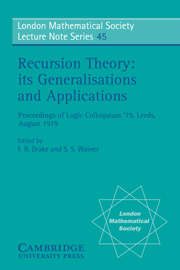A Survey of Non-RE Degrees ≤ O'
Published online by Cambridge University Press: 09 February 2010
Summary
INTRODUCTION
Most of the research on the degrees below O' has focused on the r.e. degrees. In part, this is a result of the origins of degree theory in logic where it was hoped that degrees of unsolvability would serve as a useful classification of the complexity of axiomatizable theories. Since we will be concentrating on the non-r.e.degrees below O', it seems appropriate to begin with an example which illustrates that non-r.e. degrees below O' also arise naturally in logic.
Complete Theories and Degrees Below O'
Let T be some essentially undecidable axiomatizable first-order theory (e.g., first-order Peano arithmetic or Zermelo-Fraenkel set theory). Since T is essentially undecidable, no complete extension of T is r.e. How constructive can complete extensions of T be?
Consider the following construction of a complete extension of T. Fix some effective listing u0, u1, … of the sentences of the language of T and let v0, v1, … be an effective listing of T. Our construction takes place in stages. At stage s we effectively define a set of sentences Cs which is, in effect, a finite approximation to a complete extension of T. More precisely, we require that for each i < s either ui or ∼ui is in Cs and we require that no outright contradiction, i.e., u&∼u for some sentence u, be derivable from Cs ∪ {vi: i ≤ s} by a proof with Godel number ≤ s.
Since no complete extension of T is r.e. it is not possible to define (effectively) Cs as described above in such a way that Cs ⊆ Cs+1 for a11 s.
- Type
- Chapter
- Information
- Recursion Theory, its Generalisations and Applications , pp. 52 - 109Publisher: Cambridge University PressPrint publication year: 1980
- 5
- Cited by



